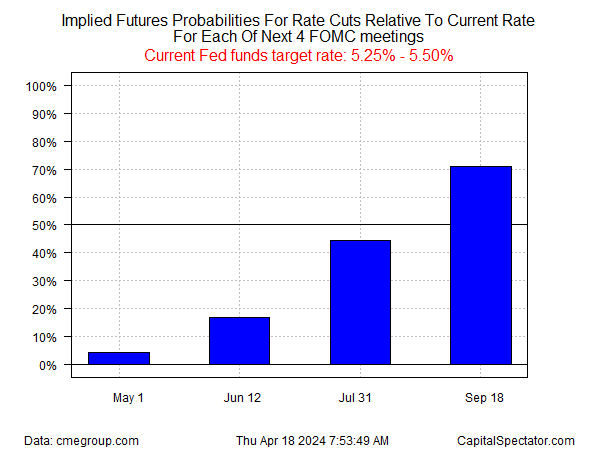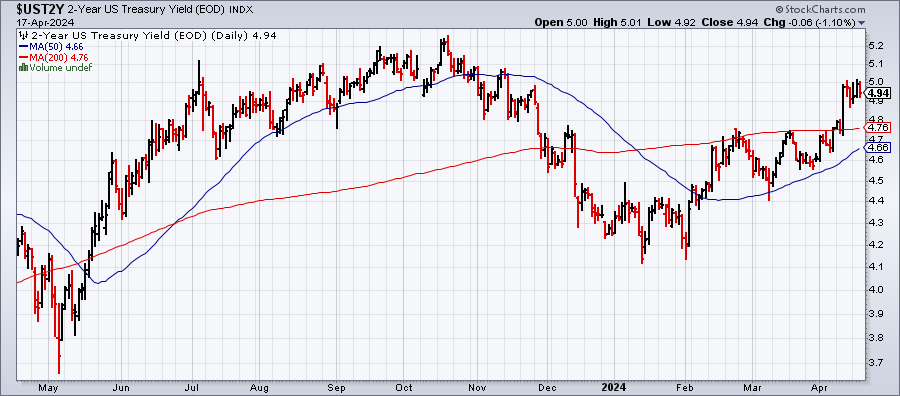Rate-Cut Forecast Now Seen for September at Earliest
James Picerno | Apr 18, 2024 13:08
The only aspect of consistency in the market’s outlook for rate cuts lately has been pushing the expected date forward. Recent history falls in line with this trend and September is now seen as the earliest date for policy easing.
Fed funds futures this morning (Apr. 18) are estimating a roughly 71% probability that the Federal Reserve will reduce its current 5.25%-5.50% target rate at the Sep. 18 meeting, based on CME data.
Take it with a grain of salt, given the rise and fall of earlier tipping points. A month ago, for example, the odds-on favorite was a rate cut at the June 12 FOMC meeting — a forecast that has since faded to less than a 20% guesstimate.

For some economists, the wont-get-fooled-again mindset is now in high gear. Bank of America (NYSE:BAC) economists, for instance, advise that there’s a “real risk” that rate cuts will be delayed until March 2025 “at the earliest,” CNBC reports.
“We think policymakers will not feel comfortable starting the cutting cycle in June or even September,” BofA economist Stephen Juneau writes in a research note.
“In short, this is the reality of a data-dependent Fed. With the inflation data exceeding expectations to start the year, it comes as little surprise that the Fed would push back on any urgency to cut, especially given the strong activity data.”
Meanwhile, the Treasury market is waiting for the next shoe to drop, or not. The policy-sensitive 2-year yield has run up recently, but has been in a holding pattern over the past five trading sessions through yesterday’s close (Apr. 17).
Hovering in the 4.9%-to-5.0% range, the 2-year rate appears to be waiting for the next round of inflation data before making a sharp move one way or the other.

The next major release for US inflation data is more than a week away – Friday, Apr. 26, when the government publishes PCE price data for March. Consensus forecasts are expecting a mixed bag for the one-year change: a slightly higher rise headline PCE to 2.5% and a tick down for core PCE to 2.7%.
The PCE forecasts echo the previously released March numbers for consumer price inflation. In other words, it’s not obvious that deeper clarity on the inflation outlook is near. In turn, a degree of stasis for Treasury yields and rate-cut expectations is a reasonable bet. But don’t get too comfortable… this too shall pass.
Trading in financial instruments and/or cryptocurrencies involves high risks including the risk of losing some, or all, of your investment amount, and may not be suitable for all investors. Prices of cryptocurrencies are extremely volatile and may be affected by external factors such as financial, regulatory or political events. Trading on margin increases the financial risks.
Before deciding to trade in financial instrument or cryptocurrencies you should be fully informed of the risks and costs associated with trading the financial markets, carefully consider your investment objectives, level of experience, and risk appetite, and seek professional advice where needed.
Fusion Media would like to remind you that the data contained in this website is not necessarily real-time nor accurate. The data and prices on the website are not necessarily provided by any market or exchange, but may be provided by market makers, and so prices may not be accurate and may differ from the actual price at any given market, meaning prices are indicative and not appropriate for trading purposes. Fusion Media and any provider of the data contained in this website will not accept liability for any loss or damage as a result of your trading, or your reliance on the information contained within this website.
It is prohibited to use, store, reproduce, display, modify, transmit or distribute the data contained in this website without the explicit prior written permission of Fusion Media and/or the data provider. All intellectual property rights are reserved by the providers and/or the exchange providing the data contained in this website.
Fusion Media may be compensated by the advertisers that appear on the website, based on your interaction with the advertisements or advertisers.